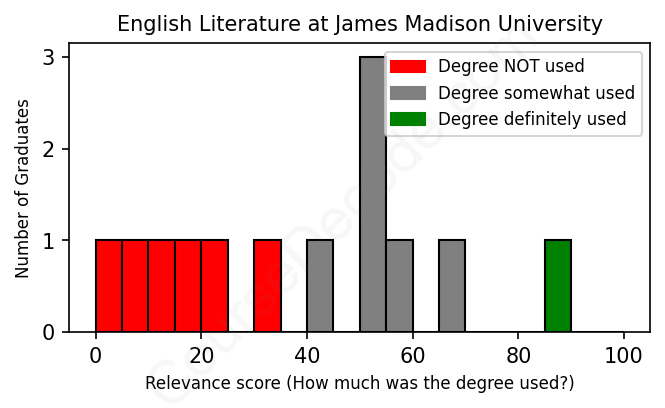
First, some facts. Of the English Literature graduates from James Madison University we've analyzed , here's how many have used (or NOT used) their degree in their career:

These are estimates based on AI analysis of 13 LinkedIn profiles (see below).
The verdict? Bad. Overall, with an average relevance score of 38%, English Literature graduates from James Madison University have a substantially lower likelihood (-29%) of finding work in this field compared to the average graduate across all fields:
And for comparison, here's the chart for all profiles we've looked at across all degrees.
Also, after graduating, only 30% of these graduates have pursued further education other than another Bachelor's degree (such as a Masters degree or other), compared to the average across all profiles of 35%. This suggests a Bachelors degree is enough for most English Literature graduates, and it's normal to look for work straight after graduation.
See the details:
|
Relevance score: 44% We think this person has gone into a career only somewhat relevant to their degree. We think this person has gone into a career only somewhat relevant to their degree.
DEGREE INFOGraduated in 2016 from James Madison University with a Bachelor of Arts - BA in English Literature. Also pursued further education since (see below). JOB HISTORY SINCE GRADUATIONClerk Kelley Drye & Warren LLP Nov 2016 - May 2017 Paralegal  Musolino and Dessel, PLLC Jun 2017 - Jul 2019 Assistant District Manager  Manhattan Community Board 3 Dec 2022 - Present FURTHER DEGREES DONE SINCE GRADUATINGMaster's degreePratt Institute 2019 - 2022 ABOUTNo information provided. |
The top 10 most common jobs done by the graduates we've analyzed (ranked most common to least) are:
From the job profiles of graduates with an English Literature degree from James Madison University, it seems like most of them have ended up in a wide range of positions that rarely align closely with their field of study. Many have taken on managerial roles, especially in industries like customer service, retail, or event management, where skills in communication are valuable but not specifically tied to literary analysis or literature itself. Positions like Substitute Teacher or ESL Teacher are more directly related, as they utilize the educational training tied to the degree. However, these roles are somewhat mixed, since they don't all delve deeply into literature as one might expect from an English Literature background.
Overall, while there are a few standout roles that leverage their knowledge of English literature—like teaching English or working in publishing—the majority of jobs skew towards management, sales, or other fields that don’t require deep expertise in literature. So, while there are some connections to their educational background, most of the jobs seem to be more about general skills—like communication and critical thinking—rather than specific literary knowledge. This paints a picture of English Lit graduates finding valuable skills in their degree but often steering into broader career paths that might not relate directly to the books and analysis they studied, which is not unusual for liberal arts graduates these days.
Here is a visual representation of the most common words in job titles for English Literature graduates (this is across all English Literature graduates we've analyzed, not just those who went to James Madison University):

Looking at the career paths of graduates from James Madison University with a degree in English Literature, it seems like they're all over the map when it comes to their first jobs. It appears that many of them start off in teaching roles or customer service positions, which might not be surprising given the skills they’ve developed during their studies. For instance, we see a lot of substitutes or ESL teachers right after graduation, or folks working in managerial positions that might not directly relate to English but still require communication skills. Some even venture into freelance work like web design or various retail roles. So, initially, those starting jobs might feel a bit disconnected from English Literature itself.
Fast-forward five to ten years, and the picture gets a little clearer, with some graduates finding success in roles that capitalize on their communication abilities—even if they're not directly in literature. For example, there are graduates who move into project management and even HR roles, indicating some have taken their initial teaching or customer service experience and leveraged it into something more corporate. However, there's a noticeable trend of people stepping outside the traditional English-centric careers. While some have landed impressive positions in management and the creative fields, many end up in roles that are more about people skills and management rather than focusing deeply on writing or literature. So, while there are certainly success stories, many graduates seem to pivot quite a bit, showing that an English Literature degree opens doors but may not always lead directly to a related field right after graduation.
Getting a Bachelor’s degree in English Literature, whether at James Madison University or elsewhere, can be a mixed bag. It’s not necessarily super hard, but it does require a lot of reading and writing, which can feel overwhelming at times. You’ll dig into a variety of texts, and some can be pretty dense, so if you’re not into spending hours analyzing poetry or novels, it might feel tougher. That said, if you enjoy literature and expressing your thoughts through essays, you'll probably find it rewarding and not too difficult. So, if you're passionate about stories and language, you might find the work more enjoyable than challenging!
Most commonly, in the LinkedIn profiles we've looked at, it takes people 4 years to finish a Bachelor degree in English Literature.
Looking at these JMU grads, it seems like the financial picture is pretty mixed. Some have landed solid positions that suggest they're making decent money, like the Corporate HR Director or the President & Sales Director roles, which probably come with good salaries. Others, especially those working in teaching and food service, might not be pulling in as much—like the servers and substitute teachers, who typically earn pretty modest wages. It also seems like a few took a while to find strong roles after graduation, bouncing around various jobs before landing something better. So, while some are likely doing well financially, others may still be grinding away to make ends meet.
Here is a visual representation of the most common words seen in the "about" section of LinkedIn profiles who have a Bachelor degree in English Literature (this is across all English Literature graduates we've analyzed, not just those who went to James Madison University). This may or may not be useful:

Here are all colleges offering a Bachelor degree in English Literature (ordered by the average relevance score of their English Literature graduates, best to worst) where we have analyzed at least 10 of their graduates: